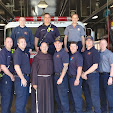Birth of Saint John the Baptist
First Century
June 24—Solemnity
Liturgical Color: White or Gold
Patron Saint of converts and epileptics
A rugged forerunner cuts a path for his cousin
“Dies natalis” means “birthday” or “anniversary” in Latin. But for early Christians, “dies natalis” referred to a martyr’s date of death and its subsequent commemoration in the Church’s liturgy, most typically through the assigning of a feast day. Most saints, martyrs or otherwise, are commemorated on, or near, the date of their death, the date their body was transferred to its final resting place, or on another significant date in their lives—date of ordination, coronation as pope, consecration as nun, etc. Besides Christ Himself, only two saints’ birthdays are commemorated liturgically: The Virgin Mary’s on September 8, exactly nine months after the Feast of her Immaculate Conception; and Saint John the Baptist’s on June 24, today’s feast. Saint Mary and Saint John were both sanctified or made holy before they first opened their eyes to the light or ever gulped a mouthful of fresh air. A long span of years did not turn them into saints. God made them holy from the start. So we commemorate their lives from the start, from their birthdays.
Only the Gospel of Saint Luke tells us the details of John’s birth. John’s mother and father were Elizabeth and Zechariah. They were beyond the age of having children. But Zechariah, a priest who served in the Temple in Jerusalem, was told one night by the Archangel Gabriel that Elizabeth would give birth to a boy they must name John. Zechariah was dumbfounded. Literally, when he disbelieved this annunciation, he was rendered speechless until the child’s birth. When his speech was finally restored, a torrent of praise gushed out in the canticle known as the Benedictus. It is prayed as part of the Breviary every single day at morning prayer by hundreds of thousands of priests and nuns the world over. Zechariah’s prayer of praise lives on.
The celebration of the nativity of John the Baptist is perhaps the oldest liturgical feast day in all Christendom, much older than the Feast of Christmas itself. It was at one time celebrated with three distinct Masses—vigil, dawn, and daytime—just like Christmas still is. The beheading of John celebrated on August 29, is of equally ancient origin. The oldest liturgical books even, incredibly, indicate that there was once a liturgical commemoration of the conception of John the Baptist celebrated nine months prior to his birth, on September 24.
Today’s feast is placed three months after the Annunciation, on March 25, because that gospel scene tells us that Elizabeth, John’s mother, was six months pregnant at the time. Three more months take us to June 24. (The one-day discrepancy between March 25 and June 24 is an accident of counting. If December and June each had thirty-one days there would be no discrepancy.) Three related feast days line up beautifully: March 25, the Annunciation; June 24, the birth of John the Baptist; December 25, the birth of Christ. John’s birth foretells Christ’s birth. Although the historical chronology may not be exact, the dates show the theological interconnection among the three feasts.
All parents are naturally curious to discover the sex of their child in utero. Some allow themselves to be told the sex. Others wait in suspense. Elizabeth and Zechariah were told by a winged messenger of God Himself that they would have a boy. That little boy grew to be a man, a great man, who accepted death rather than swallow his words criticizing the powerful Herod Antipas. John ran ahead of Christ, clearing the ground so that the Lord’s pathway would be clear. This forerunner baptized the Christ, preached and prophesied like the Christ, fasted and prayed like the Christ, and died for the truth like the Christ. But he did not rise from the dead like the Christ. There is only one Easter. We rejoice at Saint John the Baptist’s birth, because what followed merits rejoicing. We rejoice at his birth because we rejoice at the great and generous God who intervenes in our lives, who discovers us before we discover Him.
May the birth of Saint John the Baptist deepen our love for children. May each child grow, to live, and to become the great men and women God invites them to be. Amen.




